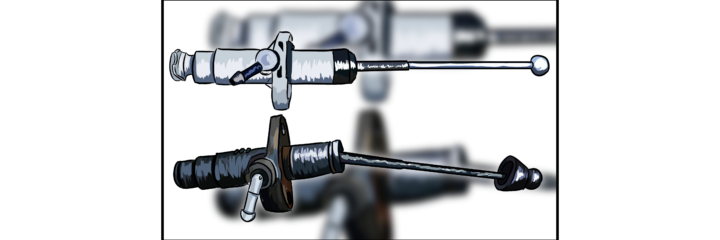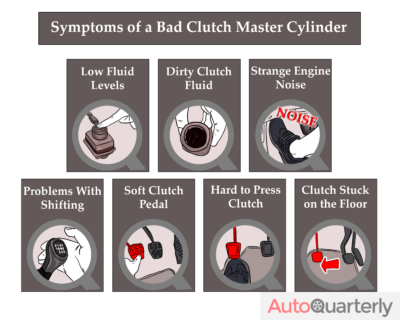In vehicles with manual transmission, the clutch master cylinder is an essential part that is responsible for the safe movement of the vehicle. Without it, you may find that you cannot use the clutch pedal in your car and may be at risk of accidents caused by the failure of the clutch. Fortunately, there are some noticeable symptoms that you can look out for if you suspect that the clutch master cylinder in your car is failing.
Below, we will be discussing exactly how the clutch master cylinder works and why it is important for your vehicle. Then, we will be giving you information on symptoms that you need to look out for that may indicate your clutch master cylinder is causing problems in your car.
We will also be telling you average replacement costs so you’re fully prepared to deal with your vehicle’s issue and get back to safe driving.
What Is the Clutch Master Cylinder and Why Is It Important?
The clutch master cylinder is found in cars that operate with manual transmission. It transfers the force that you place on the clutch pedal via clutch fluid into the clutch slave cylinder, controlling the clutch and allowing your transmission to function correctly. You can read more about this process and each of the components involved here.
Because the clutch master cylinder works with hydraulics, it is prone to leaks and fluid issues, some of which can cause significant problems with operating the clutch pedal and shifting gears. Some clutch master cylinders may also wear out over time or become damaged due to other problems with your vehicle.
If you suspect that your clutch master cylinder is operating incorrectly, it is important to evaluate the symptoms and fix the issue as soon as possible. Without the clutch master cylinder functioning, you may run into issues using your clutch pedal that can create a dangerous situation or cause you to lose control of your car.
Symptoms of a Bad Clutch Master Cylinder
If you are experiencing one or more of the below symptoms of a bad clutch master cylinder, you should consider taking your car to a professional to get the problem properly diagnosed and restore your car to its best condition.
Low Fluid Levels
Low levels of clutch fluid in your vehicle may indicate a leak somewhere in the system that is causing your clutch master cylinder to fail. This can happen over time as seals wear down or may be a result of a crack or hole somewhere in the clutch system.
To check for a leak of fluid, fill up the clutch fluid reservoir to the indicated full line (your vehicle owner’s manual will tell you which type of fluid to use). Check the fluid routinely over 48 hours and if you notice the levels dropping drastically, you most likely have a leak.
Dirty Clutch Fluid
Dirty clutch fluid is a sign that the seals of your clutch master cylinder may be failing. The dark color is typically caused by the rubber in the seals breaking down and falling into the clutch fluid; as they dissolve, they cause a dark or dirty color in the fluid.
In order to be certain about dirty clutch fluid, you can follow this article about changing the clutch fluid. Once you have all new fluid in the reservoir, wait a day or two before checking again. If the fluid is dark again, then you likely have a problem with the seals in the clutch master cylinder.
Strange Engine Noise
If you hear strange or loud engine noises when your car is in gear or when you press on the clutch pedal, you may have a bad clutch master cylinder. These noises are caused by the master cylinder failing to engage properly. Loud engine noises will typically be accompanied by other signs of a bad clutch master cylinder such as problems with shifting gears or issues pressing the clutch pedal.
Problems With Shifting
The clutch master cylinder is essential in helping you to shift gears properly. When this part fails, it is no longer able to generate the hydraulic pressure needed to engage the transmission and shift gears properly. This can create serious issues when it comes to driving your car safely and may cause an accident if left untreated.
Soft Clutch Pedal
A soft or spongy clutch pedal is likely the result of extra air in the hydraulic system that the clutch master cylinder is part of. More often than not, this extra air is caused by a leak in the system and the resulting lack of pressure can lead to a loss of control over the clutch pedal.
Hard to Press Clutch
If you press on the clutch pedal and it is hard or impossible to disengage your clutch master cylinder is likely faulty. The entire function of the clutch master cylinder is to create the right amount of pressure and enable the clutch pedal to be depressed. If the cylinder is leaking or otherwise damaged you may not be able to engage the clutch pedal at all.
Clutch Stuck on the Floor
If, when pressing on the clutch pedal, the clutch hits the floor, it shows that there is a complete loss of pressure in your car’s hydraulics system. This can be caused by either a leak in the clutch master cylinder or external wear and tear that results in the cylinder working incorrectly.
You will need to get this issue treated as soon as possible because you cannot drive with a clutch pedal that repeatedly becomes stuck and you will be at risk of an accident.
How Long Does a Clutch Master Cylinder Last?
Clutch master cylinders are fairly sturdy and designed to last a long time in your car. As such, they don’t need to be on a regular schedule of maintenance or changed on a routine basis. They will typically last around 100,000 miles before you may experience the symptoms of a failing clutch master cylinder and have to seek out a replacement.
However, you may also never have issues with this part for as long as you own your vehicle.
Replacement Cost for a Bad Clutch Master Cylinder
Fortunately, the clutch master cylinder is not the costliest item in your car to replace or repair. Depending on your car’s make and model, you could be paying anywhere from $110 to $420. Parts alone will cost between $30 and $300 – this varies depending on brand and what is need for your car – and labor costs will likely range between $80 and $120 per hour.
The replacement of a clutch master cylinder shouldn’t take too long, so you will probably be paying for around an hour of work. It is also important to note that local mechanics and repairs shops are likely to give you a better price on labor than a dealership would.
Keep in mind when looking at costs that other components on the clutch master cylinder system, such as the clutch slave, will often fail at the same time, so you may need to pay a little more than this in both parts and labor to receive a complete repair of your vehicle.
Can You Repair a Clutch Master Cylinder at Home?
If you want to save a little bit of money on repairing your clutch master cylinder, it is possible to replace this part at home. You may need to have a little bit of DIY knowledge to accomplish this, but it is not the hardest part to fix on your car.
In order to repair the clutch master cylinder at home, you will need to drain the clutch fluid, locate and remove the broken cylinder, repair or replace the part, and then refill the clutch fluid. This video can help you understand how to complete this process.
Completing this repair wrong does run the risk of introducing air into the clutch’s hydraulic system or creating further issues with the clutch pedals; for anyone who is wary about DIYing this repair, it is a good idea to consult with a professional to ensure that the clutch master cylinder is the true culprit behind your car’s issues and to have them fix the problem for you.
Keep Your Clutch in Shape
The clutch master cylinder is an essential part in any car with manual transmission. Without this part, it would be impossible to operate the clutch pedal and keep your car moving both smoothly and safely.
If you suspect that your car has a faulty clutch master cylinder, you should first work to evaluate the symptoms with the help of our list, and then take your vehicle to a professional to get the issue fully repaired and your clutch system back in perfect shape.



